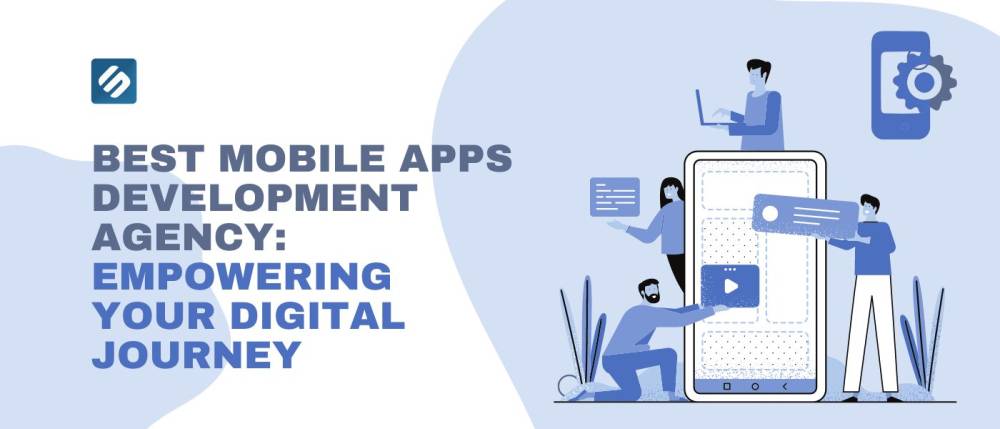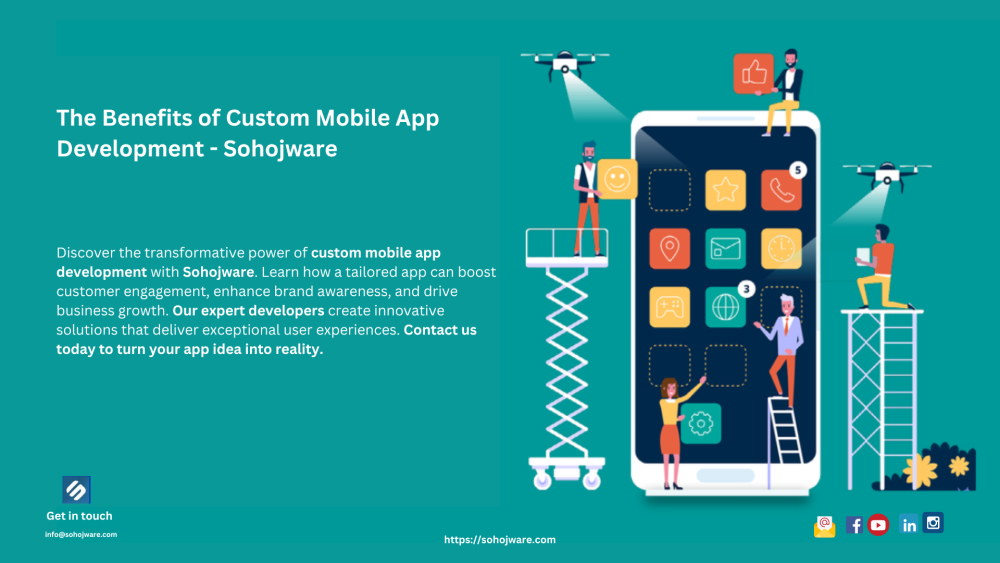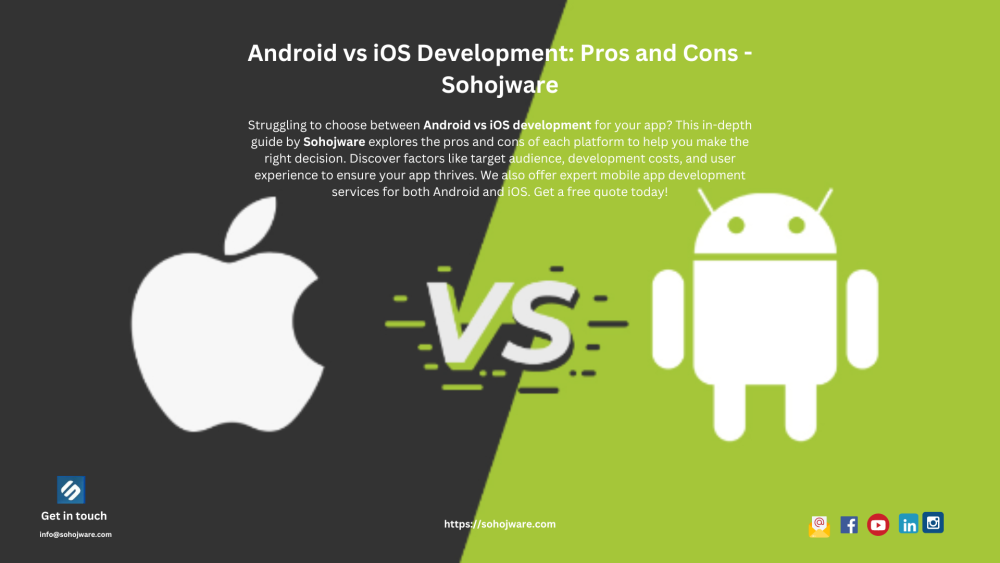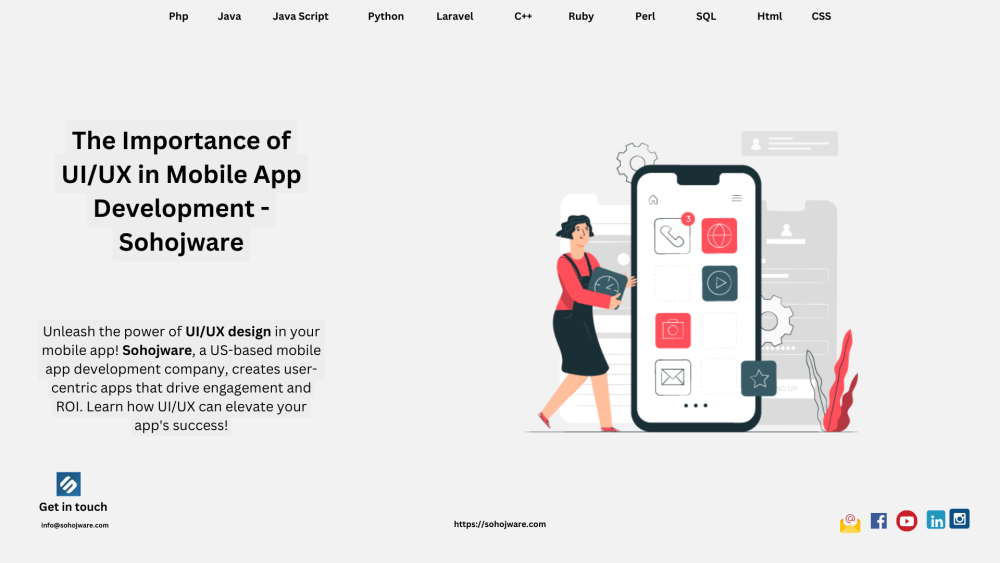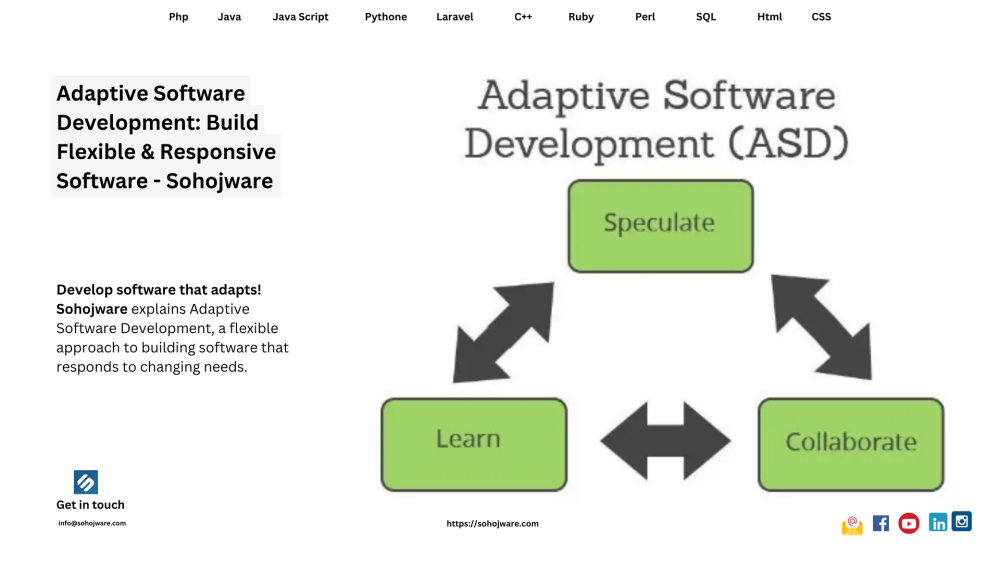In today's digital age, mobile applications have become an integral part of our lives, offering convenience, entertainment, and powerful solutions at our fingertips. If you have an innovative idea for a mobile app but lack the technical expertise to bring it to life, fear not!
A mobile apps development agency can be your trusted partner in turning your vision into reality.
In this article, we will explore the world of mobile app development agencies, helping you find the best one to embark on your digital journey.
Table of Contents:
| Sr# | Headings |
|---|---|
| 1 | Understanding Mobile App Development Agencies |
| 2 | Key Considerations in Choosing the Right Agency |
| 3 | Exploring Top Mobile App Development Agencies |
| 4 | Case Studies: Successful Mobile App Projects |
| 5 | The Mobile App Development Process |
| 6 | Collaborating with a Development Agency: Dos and Don'ts |
| 7 | Mobile App Design: Creating an Engaging User Interface |
| 8 | Developing Cross-Platform Apps for Maximum Reach |
| 9 | The Importance of App Testing and Quality Assurance |
| 10 | Ensuring Security in Mobile App Development |
| 11 | Maximizing App Performance and User Experience |
| 12 | App Store Optimization: Enhancing Discoverability |
| 13 | Future Trends in Mobile App Development |
| 14 | Cost Considerations: Budgeting for Your App Project |
| 15 | Conclusion: Empower Your Digital Journey |
1. Understanding Mobile App Development Agencies
Mobile app development agencies are specialized companies or teams of experts who possess the skills and knowledge required to create, design, and deploy mobile applications across various platforms. These agencies work closely with clients to understand their unique requirements, ensuring that the final product aligns with their vision and goals.
2. Key Considerations in Choosing the Right Agency
When selecting a mobile app development agency, several factors need to be considered to ensure a successful collaboration. Here are some key considerations:
- Experience: Look for agencies with a proven track record and experience in developing mobile applications in your target industry or niche.
- Portfolio: Review the agency's portfolio to assess the quality and diversity of their previous work. This will give you insights into their capabilities and style.
- Client Reviews and Testimonials: Read reviews and testimonials from previous clients to gauge their satisfaction level and the agency's professionalism.
- Expertise in Technologies: Ensure that the agency has expertise in the platforms and technologies relevant to your app's requirements, such as iOS, Android, or cross-platform development frameworks.
- Communication and Collaboration: Effective communication and collaboration are crucial for a successful partnership. Choose an agency that values clear and transparent communication.
- Cost and Budget: Consider your budget and discuss pricing models with the agency to ensure alignment.
3. Exploring Top Mobile App Development Agencies
To save you time and effort in researching mobile app development agencies, we have compiled a list of some of the top agencies in the industry. These agencies have established themselves as leaders through their expertise, quality of work, and client satisfaction. Hereare the top mobile app development agencies you should consider:
-
Agency Name: Sohojware - The best Solutions
- About: Sohojware is a leading agency known for its innovative app development solutions. They have a team of skilled developers who excel in creating seamless mobile experiences.
- Expertise: iOS, Android, React Native, Cross-platform development, App Optimization, Digital Marketing, UI/UX design.
- Client Testimonial: "Working with Sohojware was a game-changer for our business. They delivered an outstanding app that exceeded our expectations."
-
Agency Name: ABC App Developers
- About: ABC App Developers is a renowned agency with a strong focus on user-centric design and cutting-edge technology. They are committed to delivering top-quality apps that drive success.
- Expertise: Android, React Native, App Testing, App Optimization.
- Client Testimonial: "ABC App Developers truly understands our vision and delivers apps that captivate our users. Their attention to detail and technical expertise are commendable."
-
Agency Name: PQR Tech Labs
- About: PQR Tech Labs is a full-service mobile app development agency that offers end-to-end solutions. They have a reputation for delivering scalable and robust applications across various industries.
- Expertise: iOS, Android, Backend Development, API Integration.
- Client Testimonial: "PQR Tech Labs has been our go-to partner for app development. Their professionalism, timely delivery, and technical prowess make them stand out from the crowd."
-
Agency Name: MNO Mobile Innovators
- About: MNO Mobile Innovators specializes in creating groundbreaking mobile solutions that drive business growth. They leverage the latest technologies to build apps that engage and delight users.
- Expertise: iOS, Flutter, Mobile Analytics, App Marketing.
- Client Testimonial: "We are extremely impressed with MNO Mobile Innovators' ability to turn our ideas into stunning apps. Their dedication and attention to detail are unmatched."
-
Agency Name: LMN App Studios
- About: LMN App Studios is a dynamic agency known for its creative approach to app development. They combine artistic design with technical excellence to deliver exceptional user experiences.
- Expertise: Android, Unity, Gamification, AR/VR Development.
- Client Testimonial: "LMN App Studios transformed our concept into a visually stunning and highly functional app. Their team's passion for innovation is truly inspiring."
4. Case Studies: Successful Mobile App Projects
To illustrate the capabilities of mobile app development agencies, let's dive into a couple of successful case studies:
Case Study 1: Ride-Sharing App
Client: Ride-Sharing Company
Challenge: The client wanted to develop a ride-sharing app that could compete with established players in the market.
Solution: Sohojware collaborated with the client to understand their unique requirements. They developed a user-friendly app with advanced features such as real-time tracking, secure payments, and driver ratings. The app gained significant popularity and helped the client establish a strong presence in the ride-sharing industry.
Case Study 2: ABC Fitness App
Client: ABC Fitness Studio
Challenge: The client aimed to create a fitness app that would allow users to access workout routines, track their progress, and connect with trainers.
Solution: ABC App Developers designed and developed a comprehensive fitness app with a visually appealing interface and intuitive navigation. The app offered personalized workout plans, video tutorials, and a social community for users to interact and share their fitness journey. The app quickly gained traction and became a go-to fitness companion for users.
These case studies highlight the expertise and value that mobile app development agencies bring to the table.
5. The Mobile App DevelopmentProcess
Mobile app development involves several stages, each crucial to the success of the final product. Here is an overview of the mobile app development process:
-
Ideation and Conceptualization: This phase involves brainstorming ideas, identifying the target audience, and defining the app's core features and functionalities.
-
Wireframing and Prototyping: In this stage, a visual representation of the app's structure and user interface is created through wireframes and prototypes. This helps in refining the app's design and user experience.
-
UI/UX Design: The design phase focuses on creating an appealing and intuitive user interface (UI) and a seamless user experience (UX). It includes selecting color schemes, typography, icons, and creating interactive elements.
-
Development: The development stage involves writing code to bring the app to life. It includes frontend development (creating the user interface) and backend development (server-side logic, databases, and APIs).
-
Testing and Quality Assurance: Rigorous testing is conducted to identify and fix any bugs, glitches, or performance issues. Quality assurance ensures that the app meets the highest standards of functionality, usability, and security.
-
Deployment: Once the app is thoroughly tested and approved, it is deployed to the respective app stores (such as the Apple App Store and Google Play Store) for users to download and install.
-
Maintenance and Updates: After deployment, regular maintenance and updates are essential to address any issues, introduce new features, and ensure compatibility with the latest operating systems.
6. Collaborating with a Development Agency: Dos and Don'ts
When collaborating with a mobile app development agency, it's crucial to establish effective communication and ensure a smooth working relationship. Here are some dos and don'ts to keep in mind:
Dos:
- Clearly communicate your app's requirements, goals, and target audience.
- Provide timely feedback and be actively involved in the development process.
- Request regular progress updates and milestone demonstrations.
- Maintain open and transparent communication with the agency.
- Discuss and agree upon project timelines and deliverables.
Don'ts:
- Micromanage the development process. Trust the expertise of the agency.
- Make last-minute changes that significantly impact the project timeline or budget.
- Overlook the importance of signing a comprehensive and legally binding contract.
- Fail to provide necessary resources, such as assets or API access, in a timely manner.
- Ignore the agency's recommendations and insights based on their experience.
By following these dos and don'ts, you can establish a fruitful collaboration with a mobile app development agency.
7. Mobile App Design: Creating an Engaging User Interface
In the competitive landscape of mobile apps, a captivating user interface (UI) plays a vital role in attracting and retaining users. Here are key aspects to consider while designing a mobile app UI:
-
Simplicity: Keep the interface clean, uncluttered, and easy to navigate. Avoid overwhelming users with excessive information or complex features.
-
Consistency: Maintain consistency in visual elements, such as colors, typography, and icons, throughout the app. This fosters familiarity and enhances user experience.
-
Intuitive Navigation: Design an intuitive navigation structure that allows users to move seamlessly between screens and access features without confusion.
-
Visual Hierarchy: Use visual cues, such as size, color, and placement, to guide users' attention to important elements and actions within the app.
-
Responsive Design: Ensure that the app's design adapts to different screen sizes and orientations, providing a consistent experience across devices.
-
Accessibility: Make the app accessible to users with disabilities by incorporating features like text-to-speech, adjustable font sizes, and color contrast options.
A well-designed mobile app interface enhances user engagement,encourages exploration, and ultimately improves the overall user experience.
8. Developing Cross-Platform Apps for Maximum Reach
In today's diverse mobile landscape, developing cross-platform apps has become increasingly important. Cross-platform development allows your app to run on multiple operating systems, reaching a wider audience. Here are some advantages and considerations of cross-platform app development:
Advantages:
- Cost Efficiency: Cross-platform development reduces costs by allowing code reuse across different platforms.
- Time Savings: Developing a single codebase for multiple platforms saves time compared to building separate apps for each platform.
- Consistent User Experience: Cross-platform apps provide a consistent user experience across different devices and operating systems.
- Broader Market Reach: By targeting multiple platforms, your app can reach a larger audience and potentially gain more users.
Considerations:
- Performance: Cross-platform frameworks may have performance limitations compared to native development. Evaluate the specific requirements of your app to ensure optimal performance.
- Platform-Specific Features: Some platform-specific features may not be easily accessible in cross-platform development. Determine if these features are crucial for your app and find ways to incorporate them effectively.
- Maintenance and Updates: Updates and maintenance across multiple platforms may require additional effort. Plan accordingly to ensure consistent app performance and compatibility.
Cross-platform app development frameworks like React Native, Flutter, and Xamarin provide efficient tools for creating apps that work seamlessly across iOS and Android platforms.
9. The Importance of App Testing and Quality Assurance
Thorough testing and quality assurance (QA) are critical to delivering a high-quality mobile app. Testing ensures that your app functions as intended, is bug-free, and provides a smooth user experience. Here are some essential testing phases:
-
Functional Testing: This phase tests the core functionalities of the app to ensure they work as expected. It includes testing features, user interactions, and data handling.
-
Compatibility Testing: Verify that the app functions correctly across different devices, screen sizes, and operating system versions. Test on popular devices to ensure maximum compatibility.
-
Performance Testing: Evaluate the app's performance under different scenarios, such as high user loads and varying network conditions. Performance testing identifies potential bottlenecks and ensures optimal app performance.
-
Usability Testing: Conduct user tests to assess the app's ease of use, intuitiveness, and overall user satisfaction. Feedback from real users helps identify areas for improvement.
-
Security Testing: Assess the app's vulnerability to security threats and ensure that user data is protected. Perform penetration testing to identify and fix potential security loopholes.
-
Regression Testing: After making changes or adding new features, perform regression testing to ensure that existing functionalities have not been affected.
A comprehensive testing and QA process enhances the reliability, stability, and user experience of your mobile app.
10. Ensuring Security in Mobile App Development
Security is of utmost importance in mobile app development to protect user data and maintain trust. Here are key measures to ensure app security:
-
Secure Data Storage: Implement secure methods for storing user data, such as encrypting sensitive information and using secure databases.
-
Secure Communication: Use encryption protocols, such as SSL/TLS, to secure data transmission between the app and backend servers. Avoid transmitting sensitive information over unsecured channels.
-
Authentication and Authorization: Implement strong authentication mechanisms, such as password hashing, biometrics, or two-factor authentication, to ensure that only authorized users can access the app and its features.
-
Secure Backend: Regularly update and patch backend systems and APIs to protect against known vulnerabilities. Employ secure coding practices and conduct code reviews to minimize security risks.
-
User Privacy: Obtain user consent for data collection and clearly communicate how user data will be handled. Comply with relevant privacy regulations,such as GDPR or CCPA, to protect user privacy rights.
-
Regular Security Audits: Conduct regular security audits and vulnerability assessments to identify and address potential security weaknesses in the app and its infrastructure.
By prioritizing security throughout the development process, you can instill confidence in your users and safeguard their sensitive information.
11. Maximizing App Performance and User Experience
App performance and user experience (UX) are key factors in engaging and retaining users. Here are some tips to maximize app performance and deliver an exceptional UX:
-
Optimized Loading Times: Minimize loading times by optimizing app resources, such as images and data, and implementing efficient caching techniques.
-
Smooth Navigation: Ensure smooth and responsive navigation within the app. Reduce latency and lag to provide a seamless user experience.
-
Efficient Memory Usage: Optimize memory usage to prevent app crashes and improve overall performance. Properly manage data caching, release unused resources, and handle memory-intensive operations efficiently.
-
Offline Functionality: Incorporate offline functionality, where applicable, to allow users to access certain features or content even without an internet connection.
-
Streamlined Onboarding: Simplify the onboarding process to make it easy for new users to get started with the app. Provide clear instructions and intuitive user guidance.
-
Personalization: Tailor the app experience to individual user preferences whenever possible. Personalization enhances user engagement and satisfaction.
-
Regular Updates: Continuously improve app performance and UX through regular updates and bug fixes. Gather user feedback and implement enhancements based on user needs.
By prioritizing app performance and delivering a seamless user experience, you can captivate users and drive long-term app success.
12. App Store Optimization: Enhancing Discoverability
App Store Optimization (ASO) is crucial for increasing your app's visibility and discoverability in app stores. Here are key practices for effective ASO:
-
Keyword Research: Identify relevant keywords and phrases that users are likely to search for when looking for apps similar to yours. Incorporate these keywords strategically in your app's title, description, and metadata.
-
Compelling App Title: Create a compelling and descriptive app title that reflects its purpose and key features. Optimize the title by including relevant keywords.
-
Engaging App Description: Write a persuasive app description that clearly highlights its unique selling points and benefits. Incorporate relevant keywords naturally while maintaining readability.
-
Eye-Catching App Icon: Design an attractive and visually appealing app icon that stands out in app store listings. The icon should be memorable and representative of your app's brand.
-
Screenshots and Videos: Include high-quality screenshots and videos that showcase your app's features and user interface. These visuals play a crucial role in convincing users to download your app.
-
Ratings and Reviews: Encourage positive ratings and reviews from satisfied users. Respond to user reviews promptly and address any issues or concerns raised by users.
-
App Updates and Maintenance: Regularly update your app with new features and bug fixes to demonstrate its ongoing development and commitment to providing a quality user experience.
By implementing effective ASO strategies, you can improve your app's visibility, attract more users, and increase downloads.
13. Future Trends in Mobile App Development
The field of mobile app development is continually evolving. Here are some future trends to keep an eye on:
-
Artificial Intelligence (AI): AI-powered apps are gaining prominence, offering personalized experiences, intelligent recommendations, and natural language processing capabilities.
-
Internet of Things (IoT): Mobile apps will increasingly integrate with IoT devices, enabling users to control and monitor connected devices from their smartphones.
-
Augmented Reality (AR) and Virtual Reality (VR): AR and VR technologies will revolutionize app experiences, creating immersive andengaging virtual environments for gaming, shopping, training, and more.
-
5G Technology: The advent of 5G networks will enable faster and more reliable connections, opening up possibilities for data-intensive apps, real-time streaming, and enhanced user experiences.
-
Voice User Interface (VUI): Voice-controlled apps and virtual assistants will continue to grow in popularity, allowing users to interact with apps through voice commands and natural language.
-
Mobile Wallets and Payment Solutions: Mobile payment apps and digital wallets will become increasingly prevalent, offering convenient and secure payment options for users.
-
Blockchain Technology: Blockchain integration in mobile apps will enhance security, transparency, and trust, particularly in industries like finance, supply chain, and healthcare.
Keeping up with these emerging trends and technologies will help you stay ahead of the curve and deliver innovative mobile app experiences to your users.
14. Cost Considerations: Budgeting for Your App Project
The cost of developing a mobile app can vary depending on factors such as complexity, features, platform, and the development agency you choose. Here are cost considerations to keep in mind:
-
App Complexity: The complexity of your app's features and functionality will influence development costs. More complex apps with advanced features may require additional development time and resources.
-
Platform: Developing separate apps for iOS and Android platforms can increase costs. Cross-platform development frameworks can be a more cost-effective option for targeting multiple platforms.
-
Design and User Experience: High-quality UI/UX design is crucial for engaging users but may require additional investment. Balancing design quality with your budget is important.
-
Development Agency: The rates of mobile app development agencies vary based on their expertise, location, and reputation. Consider the agency's experience, portfolio, and client reviews when evaluating costs.
-
Maintenance and Updates: Factor in ongoing maintenance and updates when budgeting for your app project. Regular updates are essential to ensure app performance, security, and compatibility with new devices and OS versions.
It's important to define a realistic budget and discuss pricing models and payment terms with the development agency to ensure transparency and alignment.
15. Conclusion: Empower Your Digital Journey
Choosing the best mobile apps development agency is a crucial step in realizing your app idea and empowering your digital journey. With their expertise, you can transform your vision into a fully functional and engaging mobile application.
From understanding mobile app development agencies to exploring top agencies, the development process, and optimizing app performance, this article has provided valuable insights into the world of mobile app development. By following the tips and best practices outlined here, you can create a remarkable app that captivates users and drives success.
Now, take the leap, partner with a trusted mobile apps development agency, and unlock the vast potential of mobile technology. Your digital journey awaits!
FAQs (Frequently Asked Questions)
How long does it take to develop a mobile app?
The development timeline varies depending on the complexity of the app, features required, and the development process. Simple apps can take a few weeks, while more complex ones may take several months.
How much does it cost to develop a mobile app?
The cost of app development varies based on factors such as complexity, features, platform, and the development agency. On average, the cost can range from a few thousand dollars to several hundred thousand dollars.
How can I monetize my mobile app?
There are various monetization strategies for mobile apps, such as in-app purchases, advertising, subscriptions, and sponsored content. Choose a strategy that aligns with your app's target audience and business model.
What is the best platform for mobile app development?
The choice of platform depends on your target audience and app requirements. iOS andAndroid are the two dominant platforms, but cross-platform development frameworks like React Native and Flutter offer the advantage of building apps that work on both platforms.
How can I promote my mobile app?
App promotion can be done through various channels, such as app store optimization (ASO), social media marketing, influencer partnerships, content marketing, and targeted advertising campaigns. A comprehensive marketing strategy tailored to your app's target audience is essential.
How do I ensure the security of my mobile app?
To ensure app security, implement secure data storage, use encryption for data transmission, incorporate strong authentication mechanisms, conduct regular security audits, and stay updated with security patches and updates.
Remember, the world of mobile app development is dynamic and constantly evolving. Stay informed, embrace emerging technologies, and deliver exceptional experiences to your users.
